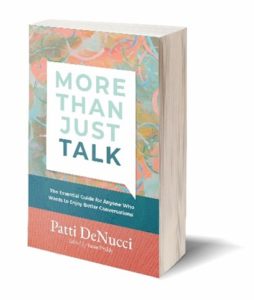“What expensive problems can good conversation skills help us solve?”
Good question! So glad my friend with the sharp marketing mind asked! To examine this question thoroughly and answer it effectively, let me break it down into smaller questions. After all, “expensive” can refer to money or to other valuable things that are nearly impossible to quantify or measure. 
Here we go…
- What does it “cost” us (and others) when we don’t acknowledge the people around us?
- What does it “cost” us when we don’t know how (or forget to) converse, communicate, and connect well — in person and in real time?
- What happens when we don’t bring a spirit of friendliness, positivity, and caring to our everyday exchanges?
- How does it make us – and others – feel?
- What relationships, learning, and opportunities might we mishandle or miss out on?
- How does an inability to converse and connect well impact our chances of getting, keeping, and succeeding at a job?
- How does it impact our ability to attract, serve, and keep clients and customers?
- What’s the impact of poor communications and a lack of goodwill and connection in the workplace?
- How does this impact the individual, the team, and the customers?
- How does it affect employee attitudes, motivation, performance, productivity, quality, and absenteeism?
- How does it impact the organization’s brand?
Whew! That’s a lot of questions and situations. Exactly.
The “cost” of all these scenarios might be financial. Disastrously so. Or it could be completely incalculable. How do you measure the cost of:
- Reduced happiness and satisfaction with life, relationships, and work
- A low sense of connection, community, and belonging
- More struggles – and little support – as we navigate life’s challenges
- Reduced interest in learning, doing, and creating
- Poor productivity, performance, and quality
- More workplace mistakes, gossip, drama, and back-biting
- Increased absenteeism and turnover
- Stunted career success
- Reduced ability to fend off, fight, and survive disease
- A lower quality of life, especially in our later years
- Reduced life span
Almost impossible to calculate the cost of many of these.
Despite what a person’s social tendencies and skills might be, we humans are hard-wired for connection, cooperation, and community. We need these to survive and thrive. Back when life was one big, extended primitive camping experience, being part of a group was essential for survival. Communicating well and working together we found food, created shelter, located water to ease our thirst, and built fires to keep us warm. To leave the tribe or to be kicked out was an almost certain death sentence. We’ve somehow forgotten this.
Today, we have so many modern conveniences, safety features, and forms of entertainment built in to our lifestyles, we can feel totally independent and self-reliant. Perhaps even anti-social or reclusive. Acknowledging the people we encounter in our daily lives, learning and utilizing good social skills, making friends, having conversations, and building connection and community appear to be optional. Maybe even out of fashion. This troubles me deeply. And it should trouble you, too.
What could a lack of good conversation and true connection be costing you — or your family, community, or organization?
To get your conversation and connection mojo revved back up, consider investing a mere $24.95 to buy (and a few moments to glance through) my new book More Than Just Talk: The Essential Guide for Anyone Who Wants to Enjoy Better Conversations. I guarantee this investment will pay for itself very quickly.
You’ll find it on Amazon and at BookPeople in Austin, Texas.



Recent Blog Comments